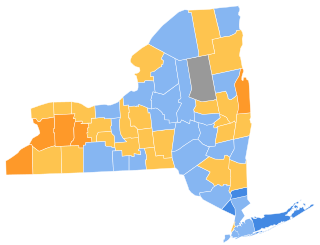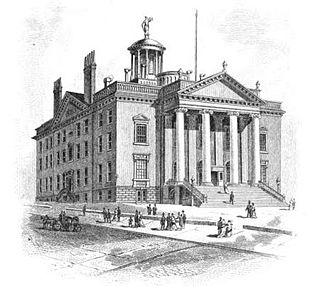| |||||||||||||||||
| |||||||||||||||||
 Results by county Seward: 40–50% 50–60% 60–70% Bouck: 40–50% 50–60% 60–70% 70–80% No Data/Vote: | |||||||||||||||||
| |||||||||||||||||
The 1840 New York gubernatorial election was held from November 2 to 4, 1840, to elect the Governor and Lieutenant Governor of New York.
| |||||||||||||||||
| |||||||||||||||||
 Results by county Seward: 40–50% 50–60% 60–70% Bouck: 40–50% 50–60% 60–70% 70–80% No Data/Vote: | |||||||||||||||||
| |||||||||||||||||
| Elections in New York State |
|---|
 |
The 1840 New York gubernatorial election was held from November 2 to 4, 1840, to elect the Governor and Lieutenant Governor of New York.
The Whig Party nominated incumbent governor William H. Seward. They nominated incumbent Luther Bradish for Lieutenant Governor.
The Democratic Party nominated former Erie Canal Commissioner William C. Bouck. They nominated state senator Daniel S. Dickinson for Lieutenant Governor.
The Liberty party nominated Gerrit Smith. They nominated Charles O. Shepard for Lieutenant Governor.
The Whig ticket of Seward and Bradish was elected.
| Party | Candidate | Votes | % | ±% | |
|---|---|---|---|---|---|
| Whig | William H. Seward (incumbent) | 222,011 | 50.30% | −1.09% | |
| Democratic | William C. Bouck | 216,726 | 49.10% | +0.49% | |
| Liberty | Gerrit Smith | 2,662 | 0.60% | N/A | |
| Total votes | 441,399 | 100% | |||

William Christian Bouck was an American politician from New York. He was the fifteenth Governor of New York, from 1843 to 1844.
The Commission to Explore a Route for a Canal to Lake Erie and Report, known as the Erie Canal Commission, was a body created by the New York State Legislature in 1810 to plan the Erie Canal. In 1817 a Canal Fund led by Commissioners of the Canal Fund was established to oversee the funding of construction of the canal. In 1826 a Canal Board, of which both the planning commissioners and the Canal Fund commissioners were members, was created to take control of the operational canal. The term "Canal Commission" was at times applied to any of these bodies. Afterwards the canal commissioners were minor state cabinet officers responsible for the maintenance and improvements of the state's canals.

Luther Bradish was an American lawyer and politician who served two terms as the lieutenant governor of New York from 1839 to 1842, while his Whig Party colleague, William H. Seward was governor. He was also co-founder of Children's Village.

The 1850 New York state election was held on Tuesday November 5, 1850, to elect the Governor, the Lieutenant Governor, a Canal Commissioner, an Inspector of State Prisons and the Clerk of the Court of Appeals, as well as all members of the New York State Assembly.

The 1854 New York state election was held on November 7, 1854, to elect the governor, the lieutenant governor, a Canal Commissioner and an Inspector of State Prisons, as well as all members of the New York State Assembly.

The 1834 New York gubernatorial election was held from November 3 to 5, 1834 to elect the Governor and Lieutenant Governor of New York. This was the first fall election in which the Whig Party participated.

The 1836 New York gubernatorial election was held from November 7 to 9, 1836, to elect the Governor and Lieutenant Governor of New York.

The 1838 New York gubernatorial election was held from November 5 to 7, 1838, to elect the Governor of New York.

The 1842 New York gubernatorial election was held on November 8, 1842, to elect the Governor and Lieutenant Governor of New York.
The Liberty Party was an abolitionist political party in the United States before the American Civil War. The party experienced its greatest activity during the 1840s, while remnants persisted as late as 1860. It supported James G. Birney in the presidential elections of 1840 and 1844. Others who attained prominence as leaders of the Liberty Party included Gerrit Smith, Salmon P. Chase, Henry Highland Garnet, Henry Bibb, and William Goodell. They attempted to work within the federal system created by the United States Constitution to diminish the political influence of the Slave Power and advance the cause of universal emancipation and an integrated, egalitarian society.

The 1839—1840 United States Senate election in New York was held on February 5, 1839 and January 14, 1840. Incumbent Senator Nathaniel P. Tallmadge was re-elected to a second term in office over scattered opposition.

The 61st New York State Legislature, consisting of the New York State Senate and the New York State Assembly, met from January 2 to April 18, 1838, during the sixth year of William L. Marcy's governorship, in Albany.

The 62nd New York State Legislature, consisting of the New York State Senate and the New York State Assembly, met from January 1 to May 7, 1839, during the first year of William H. Seward's governorship, in Albany.

The 63rd New York State Legislature, consisting of the New York State Senate and the New York State Assembly, met from January 7 to May 14, 1840, during the second year of William H. Seward's governorship, in Albany.

The 64th New York State Legislature, consisting of the New York State Senate and the New York State Assembly, met from January 5 to May 25, 1841, during the third year of William H. Seward's governorship, in Albany.

The 65th New York State Legislature, consisting of the New York State Senate and the New York State Assembly, met from January 4 to September 7, 1842, during the fourth year of William H. Seward's governorship, in Albany.

The 66th New York State Legislature, consisting of the New York State Senate and the New York State Assembly, met from January 3 to April 18, 1843, during the first year of William C. Bouck's governorship, in Albany.

The 67th New York State Legislature, consisting of the New York State Senate and the New York State Assembly, met from January 2 to May 7, 1844, during the second year of William C. Bouck's governorship, in Albany.

The 68th New York State Legislature, consisting of the New York State Senate and the New York State Assembly, met from January 7 to May 14, 1845, during the first year of Silas Wright's governorship, in Albany.

The 1844 New York gubernatorial election was held on November 5, 1844. Incumbent Governor William C. Bouck lost his bid for nomination to U.S. Senator Silas Wright. In the general election, Wright defeated former U.S. Representative and future President of the United States Millard Fillmore.